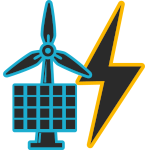1st Semester
Modelling of Electro-Physical and Electric Power Equipment and Processes
The “Modelling of Electro-Physical and Electric Power Equipment and Processes” course offers a comprehensive introduction to electrical engineering modeling. It begins with an overview of the design process, from problem formulation to manufacturing, focusing on the modeling and analysis phase. Students revisit Maxwell’s equations, the foundation of electrical engineering modeling, and explore analytical solutions alongside numerical methods like finite difference and finite element methods. A significant part of the course involves practical experience with FEMM (Finite Element Method Magnetics) software, enhancing understanding of FEM through hands-on application in both class and individual assignments.
Experimental Studies of Electro-Physical Processes
As part of the course “Experimental studies of electrophysical processes”, methods of experimental studies, rules for drawing up a plan for conducting an experiment, processing the obtained results, choosing experimental equipment and studying the principle of their operation, methods of protecting measuring equipment from guidance and interference, safety rules for working with experimental equipment are considered.
Calculation and Design of Magnetic Pulse Installations
As part of the course “Calculation and Design of Magnetic-Pulse Installations” the principle of operation and the main provisions of calculation and design of a magnetic-pulse installation and its elements are considered.
Physics of Electrostatic Processes and Technologies
The “Physics of Electrostatic Processes and Technologies” course provides an in-depth understanding of electrostatics in technology. Focusing on the generation of strong electric fields, the course covers static electricity charge formation and factors affecting charge magnitudes in technological processes. Students learn about electrification processes, electrostatic field calculations, and devices for measuring electrostatic fields. The course emphasizes safety measures and risk mitigation associated with electrostatic charges, preparing students for practical applications in industrial settings.
Photoelectric Converters
The “Photoelectric Converters” course is designed to provide students with a solid foundation in the principles of solid-state physics, with a special focus on semiconductors, which are pivotal in the functioning of photoelectric systems. This course is based on prior knowledge in higher mathematics, physics, electrical engineering, and electronics. It explores the application of photoelectric systems in diverse industrial and agricultural fields, equipping students with both theoretical knowledge and practical skills.
Technique of Strong Electric and Magnetic Fields
“Technique of Strong Electric and Magnetic Fields” is a focused course examining strong field technologies in electrotechnics, physics, and biophysics. It emphasizes high-voltage impulse installations (HVII), exploring their design, functionality, and role in various applications. The course blends theoretical study with practical lab work, addressing HVII operational modes and current industry developments. Students engage in hands-on experiments and regular consultations to deepen their understanding of these advanced technologies.
2nd Semester
Reliability and Diagnostics
“Reliability and Diagnostics” is a course focusing on applying probability theory and statistics to understand and predict the reliability and failure modes of electrical equipment, particularly High Voltage (HV) components. It covers various aspects, from insulation degradation to the unique failure modes of HV cables and capacitors, while also addressing low voltage equipment and Renewable Energy Sources (RES). This course aims to equip students with skills to assess electrical equipment’s reliability, enhancing their professional competencies in the field.
Design of Electro-Physical and Electric Power Equipment
This course offers an in-depth look at electrophysical and electric power equipment design, encompassing electromagnetic applications like high-speed forming and welding, along with ion and electron beam technologies. It also delves into electric power components such as capacitors and transformers. Practical aspects like Finite Element Method calculations are included to enhance theoretical understanding, aiming to equip students with skills in designing and understanding electro-physical and electric power equipment.
High Frequency Currents and Ultrasound in Engineering
The course “High Frequency Currents and Ultrasound in Engineering” focuses on the fundamental principles and applications of high-frequency electromagnetic fields in engineering. Students will explore the theory and practical aspects of induction heating of metals and delve into electromagnetic processes in systems with finite cross-sections. The curriculum also covers thermal calculations for induction heating, high-frequency equipment, and ultrasonic material processing.
Technique and design of experiments
The “Technique and Design of Experiments” course is an essential exploration into experimental methods in electrical engineering, blending digital and analog technologies. It introduces digital signal processors, analog-digital converters, and electrical filters, moving to practical skills such as soldering and electromagnetic field protection. The course also covers the operational principles of electron-beam and digital oscilloscopes. Focused on modern experimental methods and measuring devices, it equips students with theoretical knowledge and practical skills essential for electrical engineering challenges.
